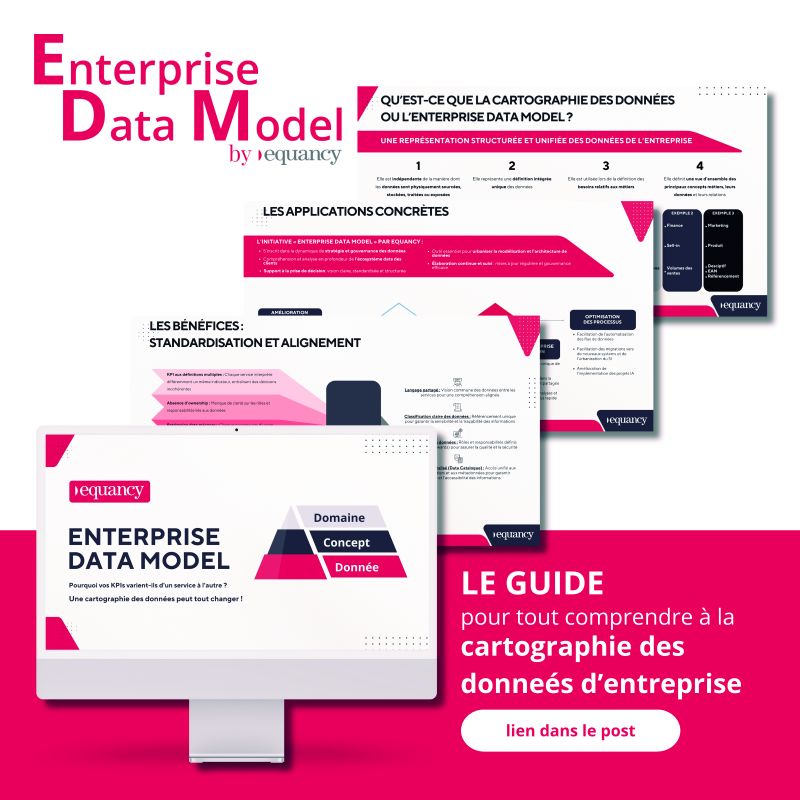Data Culture & CSR: how to make it a common battle ?
What if the development of data culture could also serve the cause of environmental awareness?
And what if data culture was one of the levers that could be used to set in motion the path towards a contributive enterprise?
And what if environmental culture was a lever for commitment to collecting key data for the transition?
These "What if..." are hypotheses filled with convictions because, at Equancy, we are convinced that the challenges of sustainability and data can be tackled together and can benefit both.
What role can data culture play in companies undergoing transformation?
In recent years, we have seen a growing awareness among organisations of the need to develop a 'data-driven' corporate culture at all levels.
The most mature companies have realised that it is essential to invest time in a data culture, to train all business lines in the use of data. So that those who handle it, and more broadly, all employees, understand the importance of data that is controlled and governed, enabling them to make informed decisions, improve operational efficiency and offer new services.
The emergence of Generative AI and the acceleration of these uses only serve to reinforce the importance of having a mastery of data assets in order to derive value from them.
Initially structured by the creation of data entities and the role of "Chief Data Officer", the orchestral conductor of the dissemination and implementation of these programmes, its democratisation has been made possible by the launch of numerous Data Academy or Digital Academy, training programmes for internal employees or external recruitment (BPCE*, La Poste**).
* https://www.digital-payments.groupebpce.com/news/data-academy-moteur-transformation-groupe-bpce/
** https://www.lapostegroupe.com/fr/actualite/la-poste-lance-son-ecole-de-la-data-et-de-lia
Data day" type events, bringing together all the company's business lines, have multiplied in order to highlight the importance of data and demystify its uses.
Finally, we have seen the emergence of data communities within companies, with new roles and responsibilities around governance: Data Manager, Data Steward, Domain Manager... or communities to democratise BI and AI...
In short, all this to say that the modern company is transforming itself and has put the culture and mastery of data at the heart of its business.
The companies that have invested in this culture are the ones that are ahead of their markets, the ones that attract and retain talent, the ones that innovate.
Before we talk about CSR culture, let's talk about ESG data
We are seeing an acceleration in regulations on non-financial issues, particularly with the arrival of the CSRD (Corporate Sustainability Reporting Directive), a new European Union directive aimed at imposing greater transparency on the impact of a company's activities on the environment (in simplified form). This new directive will apply to companies with more than 250 employees, or turnover in excess of 40 million euros, and will become increasingly stringent over the next few years.
The European green taxonomy aims to define which economic activities are considered to be ecologically sustainable.
Companies with more than 500 employees are also required to carry out a carbon audit.
However, none of these new regulations and standards can be applied without data, which plays a fundamental role in meeting the regulatory challenges.
Extra-financial reporting will therefore require an enormous amount of data from all departments.
Managing the scope 3 carbon footprint means collecting data on external stakeholders.
And that's just as well, because to reduce our impact and even go further: to make a positive contribution to the world, we need to understand where we are starting from, and to do that... we need to measure...
But to measure, you need data, it's as simple as that.
For example, the CSRD is going to ask for information on several hundred quantitative (¼) or qualitative (¾) indicators.
With a major challenge: the very existence of this data!
In the best case, this data exists in systems that are not yet linked to the company's ERP, either in Excel spreadsheets in different departments, or it doesn't exist at all and will have to be captured.
However, in order to steer the company, you need to refine your data management skills.
This will require processes to be put in place, automation, but above all a huge amount of education, desire and persuasiveness to convince people of the importance of the subject on the one hand, and of collecting this data on the other.
It's understandable that this seems a Herculean task:
For a house builder, collecting data on building sites, not only internally, but also from tier 1, 2...10 suppliers... is no easy task...
For distributors, who list thousands of products and have to motivate suppliers to provide a wealth of product information, it's not easy!
In short, there's a huge amount to be done to streamline the whole process!
And let's face it, these processes, these forms, these constraints... are extremely painful!
Data Culture & CSR: The meeting point
So there are all these processes, collections, forms and entries. Which are, as we said, tedious.
So there's a real educational challenge to motivate and mobilise the teams: we need to re-enchant and give meaning to this data.
We need to show the importance of these processes, we need to value them, we need to encourage them.
And that means cultivating a culture of environmental issues, raising awareness of the role of the company, its employees and the role of each individual in changing practices, anticipating, adapting and mitigating the impact of the crisis that awaits us.
But it also means understanding the role of data, and the issues of governance, quality and reliability.
If we don't understand the uses, the purposes and the reasons why we are being asked to enter a form or a piece of data, then clearly nobody will do it, or do it badly.
Culture, the key ingredient in any transformation.
After the digital transformation, the data transformation, it is now urgent to give impetus to the sustainable transformation.
Digital technology affects all our businesses, as does data, and CSR cuts across the board.
In all these transformations, culture is a fundamental lever for getting things moving.
So it's crucial to instil a culture of environmental and societal issues, just as it's crucial to instil a data culture today.
Data transformations are still underway, and this is accelerating with the emergence of AI and the knowledge of what it can bring, combined with the risks and biases it can engender.
As far as CSR is concerned, awareness of this as an EXCOM and strategic issue is accelerating, and that's for the best.
A unique opportunity for CSR & DATA departments to make culture a common battle.
So, dear Directors. Data and CSR Directors, go and shake up your colleagues on the COMEX, and kill two birds with one stone: turn the issues of data transformation and ecological transition into a shared opportunity.
Join forces, launch Data for Sustainability programmes co-sponsored by data management, CSR & business line by business line, and take advantage of the opportunity to :
- Educate people about climate issues, biodiversity, planetary limits and your company's contribution to the pressures being exerted.
- Explain the links between environmental, social, territorial and governance issues.
- Explain the importance of data for the company on these subjects
- Explain the importance of data for the company as a whole
- Explain the importance of data governance more generally
- Explain the importance of ethical AI
- Identify use cases with a positive impact
- Engage your employees and explain to them that we all have a role to play, because as Seth Godin puts it so well in Gregory Pouy's podcast * "We are the context...".
* https://www.linkedin.com/feed/update/urn:li:activity:7160942770809942017/
This type of approach lends itself well to events such as datakhaton, CSR & Data day, in order to unite, give impetus and inspire, in a joyful and good-humoured atmosphere, because that's what we all need to move forward.
At Equancy, we've got lots of ideas about what this could look like, so come and discuss them with us, and let's dare to take part in these great programmes in 2024!
Alexis Rousset
Director of Strategy Consulting Data & Impact




